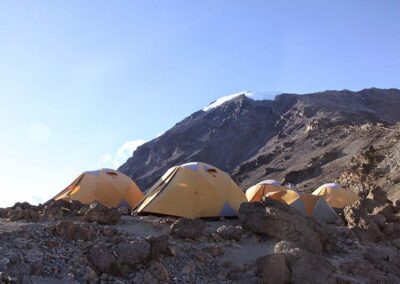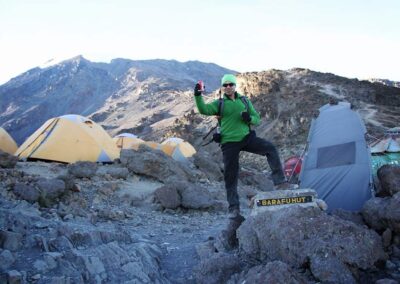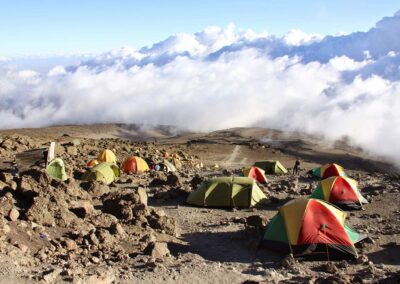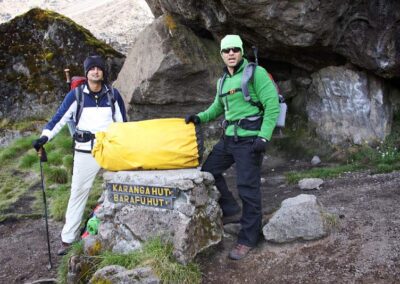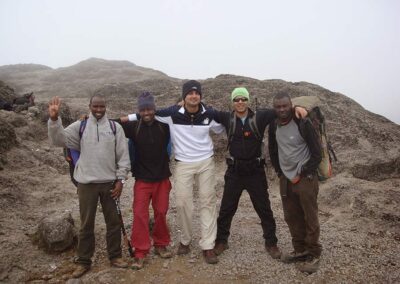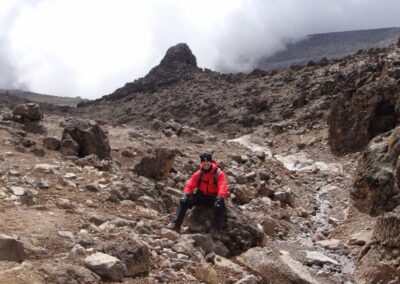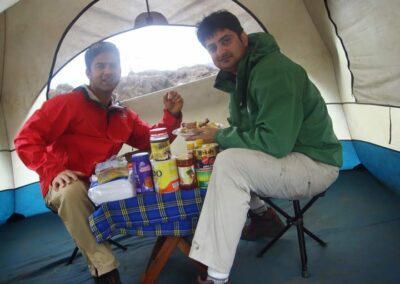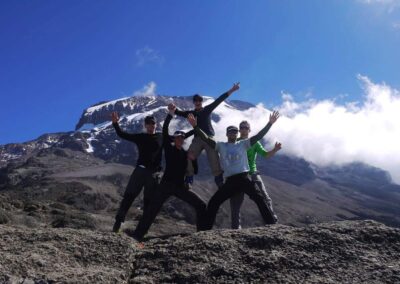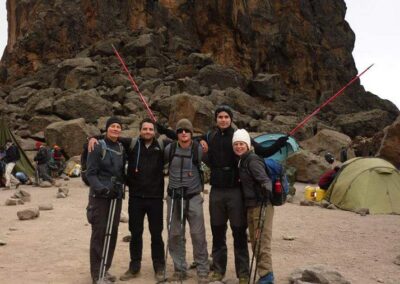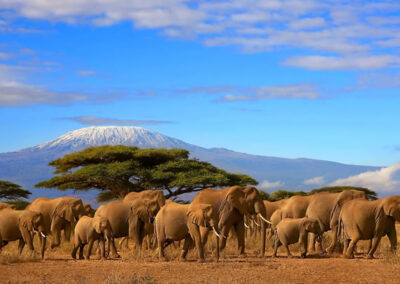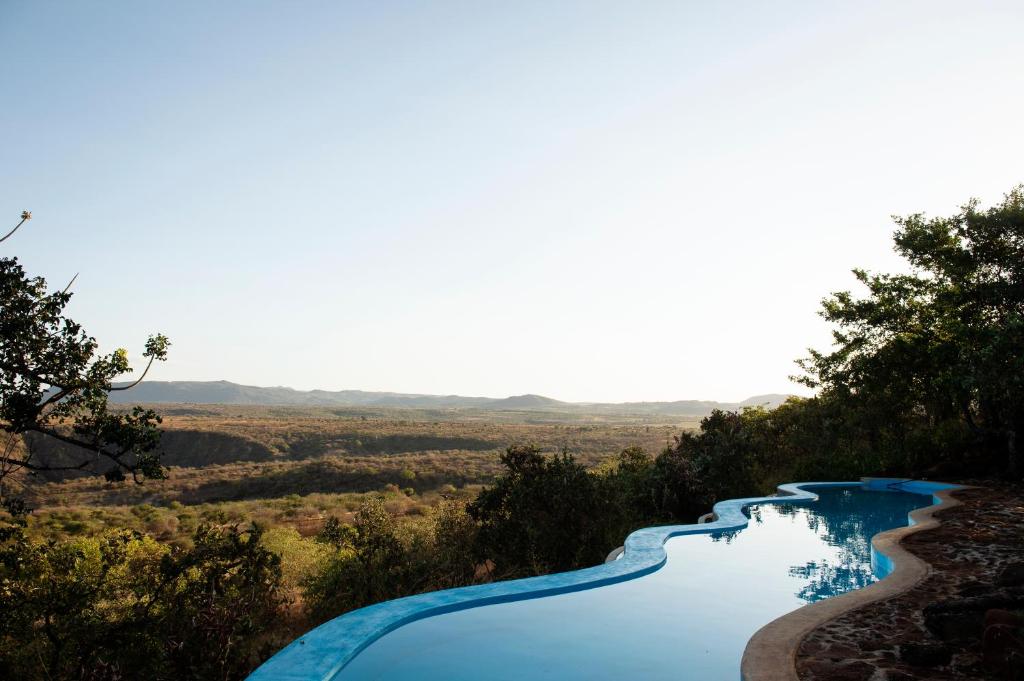Overview
The Machame Route provides a one-of-a-kind experience to test your physical and mental fortitude, as well as your fitness finesse, with its diverse terrain and breathtaking views. The trail will take you through lush rainforests, inhabited by colobus monkeys, and into heath and moorland, where ferns and ericas thrive, before ultimately reaching the icy summit of the mountain. The route spans seven days, with varying altitudes and a touch of good fortune, creating an ideal environment for acclimatization, increasing your chances of reaching the summit. During the Machame Route tour, overnight stays will be in tents.
Overview
Tour Summary
Itinerary
Inclusions
Accommodation
Trip Summary
Start: Arusha, Tanzania
End: Arusha, Tanzania
Destinations: Mount Kilimanjaro
Theme: Hiking
Age Requirement: 10 Years minimum
Physical level: Medium
Max group size: Any size
Itinerary
Day 1 – Arrival
Day 2
Start: Machame Gate (1,790 m)
Finish: Machame Camp (3,010 m)
Altitude: ↑ 1,220 m
Walking time: 5-7hrs
Day 3
Start: Machame Camp (3,010 m)
Finish: New Shira Camp (3,845 m)
Altitude: ↑ 835 m
Walking time: 4-6hrs
Day 4
Start: New Shira Camp (3,845 m)
Finish: Barranco Camp (3,960 m)
Altitude: ↑ 795 m ↓ 680 m
Walking time: 6-7hrs
Day 5
Start: Barranco Camp (3,960 m)
Finish: Barafu Camp (4,640 m)
Altitude: ↑ 680 m ↓ 50 m
Walking time: 5-7h
Day 6
Start: Barafu Camp (4,640 m)
Finish:
Uhuru Peak (5,895 m) – Mweka Camp (3,080 m)
Altitude: 1,250 m ↓ 2,815 m
Walking time: 10-14hrs
Day 7
Start: Mweka Camp (3,080 m)
Finish: Mweka Gate (1,630 m)
Altitude: ↓ 1,450 m
Walking time: 2-3hrs
Day 1 – Kilimanjaro International Airport – Arusha:
Arrival at Kilimanjaro International Airport, you will be greeted by our transfer driver and taken to Tulia Boutique Hotel and Spa in Arusha. The rest of the day is for you to do as you please. You can opt to spend the day relaxing by the lodge pool or explore the town of Arusha. In the late afternoon you will be briefed by our team on what to expect on your upcoming trek.
Day 2 – Arusha to Machame Gate (1,790 m) to Machame Camp (3,010 m):
After breakfast, you will be taken to the entrance gate of Kilimanjaro National Park. While your guide handles the registration forms, you can take the time to take in the surrounding area, read the information boards and watch the mountain crew prepare for the climb. You will start your trekking adventure through the cool rainforest with lush green moss and lichen carpeting the ground and tall trees and ferns sheltering you from the sun. You might spot the black and white colobus monkeys in the branches as you walk past. After 5 to 6 hours, you will arrive at the Machame Camp, situated 3,010 m above the tree line, where you will have your evening meal and overnight stay in tents.
Day 3 – Machame Camp (3,010 m) to New Shira Camp (3,845 m):
You will continue your ascent, leaving the rainforest behind and entering the moor and heathland. On your way to New Shira Camp (3,845 m), you will enjoy spectacular views of the mountain range. In the mid-afternoon, you will reach your destination where you can enjoy a view of the sun glistening against the rock face and glacier of Kibo. You will spend the night at New Shira Camp.
Day 4 – New Shira Camp (3,845 m) to Lava Tower (4,640 m) to Barranco Camp (3,960 m):
Today, you will climb 700m, with your final destination only slightly higher than the previous night. This will help your body acclimatize to the altitude changes as you will reach a height of over 4,500 m in the following days. You will start your trek by ascending above the Shira Plateau towards the Lava Tower (4,640 m). The landscape changes to an alpine desert with the vegetation becoming more sporadic. You will walk through the sweeping Barranco Valley, with its lobelia and giant senecio plants, and arrive at the Barranco Camp, the most beautiful camp on the mountain, after approximately 6 to 7 hours. You will have your evening meal and spend the night at the Barranco Camp.
Day 5 – Barranco Camp (3,960 m) to Barafu Camp (4,640 m):
Today, you will climb the “Barranco Wall” where you will need a steady hold. Your guides will be there to assist you wherever necessary. You will walk across the ridge while enjoying beautiful views of Kibo’s south glacier. In the Karanga Valley, you will stop for lunch before embarking on a 2 to 3-hour climb to Barafu Camp (4,640 m). You will have a well-deserved break, evening meal, and an early night at the camp.
Day 6 – Barafu Camp (4,640 m) – Uhuru Peak (5,895 m) – Mweka Camp (3,080 m):
On Day 6, you will begin your ascent to Uhuru Peak from Barafu Camp (4,640 m) at around midnight. A hot tea and light snack will be provided to awaken you before the climb. You will be guided by a headlight as you ascend the screes of Kibo, and after 5 to 7 hours of walking, you will reach Stella Point. From there, you will follow the crater ridge until you finally arrive at Uhuru Peak (5,895 m), where you will enjoy a 360° view over the surrounding landscape. After taking in the view, you will descend along the same route and arrive at Barafu Camp just before midday. You will have a warm meal and some relaxation time before continuing on to Mweka Camp (3,080 m) for another 1 to 2 hours. At Mweka Camp, you will have your evening meal and settle in for the night.
Day 7 – Mweka Camp (3,080 m) – Mweka Gate (1,630 m) – Arusha:
On Day 7, after breakfast and a traditional farewell ceremony, you will begin your gentle descent through the rainforest to Mweka Gate (1,630 m). Your driver will be waiting for you there to take you back to the Tulia Boutique Hotel and Spa, where you can relax at the pool and celebrate your achievement.
Day 8 – Arusha – Kilimanjaro International Airport:
On this day African Beetles Safaris Team will organize a private departure transfer to either Arusha Airport or to Kilimanjaro International Airport for your flight back home or flying to Zanzibar Island.
How big can I expect the group to be?
This is a private tour and hence there won’t be any other climbers joining you. Your group will consist of only the people you chose to travel with and your mountain crew.
Is there an age limitation for this climb?
According to the national park authorities, children under the age of 10 years are only allowed to hike until Horombo Hut (3700 m). There are no official restrictions for children above the age of 10 years but because the chances of children succumbing to mountain sickness are a lot higher than they are with adults, we recommend a minimum age of 14-16 years. Please note that children of all ages have to be accompanied by one of their parents at all times. Although there is no maximum age restriction, a medical check-up is advisable for climbers above the age of 60.
Do I have to be extremely fit?
Africa’s highest peak is one of the only mountains of this magnitude that can be conquered without you being an experienced alpinist. However, it goes without saying that you should be healthy and fit to master the 4-6 hour daily hikes as well as the 12-14 hour hike on the night of the summit. In addition thereto, strong willpower and endurance is required.
What kind of weather is to be expected and when is the best time to travel?
The warmest time with the least rainfall is between December and February, followed by the main rainy season from March until the beginning of June. Between June and October, temperatures are moderate with almost no rainfall. November is regarded as the small rainy season and daily short rainfalls with cloudy views are common.
The best time to travel is between the end of June and the middle of October and although it is possible to climb Kilimanjaro in the main rainy season, we strongly discourage anyone from doing so.
What can I expect from the route?
The Marangu Route is often considered as the easiest route to the summit. Compared to other routes, the ascent is more gradual and although both the ascent and descent follow the same route, you will be rewarded with excellent panoramic views throughout your trek (weather permitting).
Where will I sleep?
You will overnight in basic mountain huts.
What about the ablution facilities?
Apart from very basic long drops (simple latrines), there are no further ablution facilities. Climbers are however provided with a bowl of warm water for their daily wash.
What meals will be provided and what type of food can I expect?
Meals are included as mentioned in the itinerary.
For breakfast there will be a choice of fruit, scrambled eggs, porridge, toast, jam, hot chocolate, coffee or tea. Lunch will be provided in form of a lunch box containing sandwiches, boiled eggs, chicken etc.
For dinner you will enjoy soup and bread followed by meat or poultry along with starch (i.e. chips, mashed potatoes, pasta or rice) as well as vegetables.
While breakfast and dinner are served in a communal dining hut, lunch is enjoyed en-route.
Please let us know if you have any special dietary requirements or food allergies and we will do our outmost to cater for them (only possible with advanced notification).
How do I cope with the altitude?
Almost everybody climbing Kilimanjaro will be affected by the altitude in some or other way. Top athletes are just as much at risk of suffering from it as are people who are out of shape. Headaches, extreme fatigue, loss of appetite and nausea are all signs of possible mountain sickness. Symptoms are mostly mild, enabling you to continue your hike and only in very few instances are symptoms more acute, making an immediate descent unavoidable. Severe altitude sickness is a serious matter and you should bear in mind that it can be life threatening and at worst lead to death. It is also important to replace lost body fluids due to physical activity by drinking enough water. We suggest two to four litres per day along with magnesium to prevent muscle cramps.
What happens in the event of an emergency?
Mountain rescue services in Tanzania can in no sense be compared to the ones found in the European Alps for example. If you find yourself unable to walk, you will either be carried or transported on a wheeled stretcher. As this is by all means a very unpleasant experience, it is important that you only push yourself as far as your body allows. Helicopters are hardly ever deployed as they can only land at a lower altitude.
Please also make sure your health insurance covers you while travelling. If you are not adequately covered, we urge you to take out suitable travel insurance assuring all your medical expenses including rescue and repatriation costs are covered.
Should I bring some extra money?
Yes you should bring some extra money for tips, souvenirs and other personal expenses.
If you are bringing USD, please make sure the bills have been be printed after 2004 as any earlier printed ones will not be accepted.
What about tipping?
Tips for the mountain crew are common practice. Gratuities are a large portion of the crew’s income and thus highly appreciated. Below are some recommendations from our side (per group, not per person):
Guide: 15-18 USD per day
Assistant Guide: 12-15 USD per day
Cook: 8-10 USD per day
Waiter: 7-9 USD per day
Porter: 6-7 USD per day
What kind of clothes and gear do you recommend?
There are a few things you should pack for a Kilimanjaro climb and as the list is quite extensive, you will receive a detailed packing list from us once you have confirmed the booking.
For your convenience we also rent out all essential clothing items and other gear.
What are Tanzania’s visa requirements?
For most travellers it is possible to obtain a visa upon arrival but nevertheless, it is every visitor’s obligation to check the latest visa regulations with their respective embassies.
Every traveller is responsible to be in the possession of the required travel documents.
What about vaccinations and malaria?
Officially, no vaccinations are required by the Tanzanian health department. However, Tanzania is a yellow fever region and thus we advise that you get yourself vaccinated for this.
In general we also recommend that you have all other shots such as Tetanus, Diphtheria, Polio and Hepatitis A & B up to date.
Malaria is present in Tanzania but there are no mosquitoes at high altitude. It is your own choice if you wish to take any precautionary medication, but we suggest that you consult your doctor or travel clinic in this matter.
End of the Trek
Price: US$ 2,095 per person
Single Supplement: US $300. This is applicable for a single tracker only.
Price Includes
- Kilimanjaro trekking according to the itinerary
- Professional, English-speaking guide
- Mountain crew (cook & porters)
- Overnight stays in hotels and mountain tents
- Camping equipment (tents, sleeping mats, chairs, tables etc.)
- Portable toilet and toilet tent
- Meals according to the itinerary
- Drinking water
- All national park fees
- All mentioned transfers
Price Excludes
- Sleeping bag
- Flights
- Optional activities
- Alcoholic and soft drinks
- Visa fees
- Tips
- Personal spending money for souvenirs etc.
- Travel insurance
